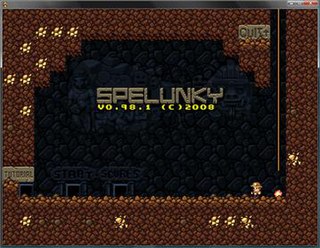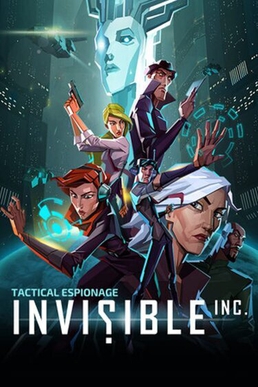
Spelunky is a 2008 source-available 2D platform game created by independent developer Derek Yu and released as freeware for Microsoft Windows. It was remade for the Xbox 360 in 2012, with ports of the new version following for various platforms, including back to Microsoft Windows. The player controls a spelunker who explores a series of caves while collecting treasure, saving damsels, fighting enemies, and dodging traps. The caves are procedurally generated, making each run-through of the game unique.

Crusader Kings II is a grand strategy game developed by Paradox Development Studio and published by Paradox Interactive. Set in the Middle Ages, the game was released on February 14, 2012, as a sequel to 2004's Crusader Kings. On October 18, 2019, the video game became free to play. A sequel, Crusader Kings III, was released on September 1, 2020. Crusader Kings II stood out from earlier Paradox games in that it attracted a more widespread audience, contributing to the growth of the company.

Realm of the Mad God is a massively multiplayer online shoot 'em up video game created by Wild Shadow Studios and currently owned and developed by DECA Games. It was in public beta from January 2010 and the browser version launched on June 20, 2011. On February 20, 2012 the game was made available on the digital distribution platform Steam for Microsoft Windows and OS X.

FTL: Faster Than Light is a real-time strategy roguelite game created by indie developer Subset Games, which was released for Microsoft Windows, macOS and Linux in September 2012. In the game, the player controls the crew of a single spacecraft, holding critical information to be delivered to an allied fleet, while being pursued by a large rebel fleet. The player must guide the spacecraft through eight sectors, each with planetary systems and events procedurally generated in a roguelike fashion, while facing rebel and other hostile forces, recruiting new crew, and outfitting and upgrading their ship. Combat takes place in pausable real time, and if the ship is destroyed or all of its crew lost, the game ends, forcing the player to restart with a new ship.

Banished is a city-building video game developed by Shining Rock Software. It was released for Windows on February 18, 2014. The game focuses on careful resource management and survival as an isolated and growing society. Its gameplay can be compared with economic theory on sustainability and optimization. Banished received mixed reviews on release, with reviewers praising graphics and difficulty early in the game, but criticizing a lack of feedback for player actions and lower emphasis on survival as the city grows.

Rogue Legacy is a 2013 platform game with roguelike elements developed and published by Cellar Door Games. The game was released for Microsoft Windows, Linux, OS X, PlayStation 3, PlayStation 4, PlayStation Vita, Xbox One, Nintendo Switch, and iOS. A sequel, Rogue Legacy 2, was released on April 28, 2022 for Microsoft Windows, Xbox Series X/S and Xbox One.

Proteus is a 2013 adventure game designed and created by Ed Key and David Kanaga for Microsoft Windows, OS X, Linux, PlayStation 3, PlayStation 4 and PlayStation Vita. In the game, the player traverses a procedurally generated environment without prescribed goals. The world's flora and fauna emit unique musical signatures, combinations of which cause dynamic shifts in audio based on the player's surroundings.
Rust is a multiplayer survival video game developed by Facepunch Studios. It was first released in early access in December 2013 and received its full release in February 2018. Rust is available on Windows and macOS. Console versions for PlayStation 4 and Xbox One developed in conjunction with Double Eleven were released in May 2021. Rust was initially created as a clone of DayZ, a popular mod for ARMA 2, with crafting elements akin to those in Minecraft.

Invisible, Inc. is a turn-based tactics stealth game incorporating elements of roguelike gameplay, by Klei Entertainment. The player acts as the remote operator for an espionage agency that has come under attack from multinational corporations, and directs agents in covert missions, acquiring resources and support in order to enable relocation of the agency's computer system to a safe haven within a limited amount of time.

Endless Legend is a turn based 4X fantasy-strategy game developed by Amplitude Studios and published by Iceberg Interactive for Microsoft Windows and Mac OS X in September 2014. The purpose of the game is to dominate the world of Auriga with one of the fourteen races/factions through either diplomacy or war while developing new technologies, exploring new lands and founding new cities.

Mordheim: City of the Damned is a tactical role-playing game video game developed by Rogue Factor, a branch of Cyanide, for Microsoft Windows and published by Focus Home Interactive on November 19, 2015. The game is based on Games Workshop's 1999 tabletop game Mordheim.

Devil Daggers is a first-person shooter video game developed and published by indie development team Sorath. Players are tasked with surviving for as long as possible against swarms of demonic enemies on an arena shrouded in darkness. The player character can fire daggers from their fingers to eliminate foes and move about to avoid contact with them. The player dies upon touching an enemy, and as time passes, more threatening creatures begin to appear. Survival times are recorded on a global leaderboard where replays of playthroughs can be accessed and viewed. The deliberate use of unfiltered textures and effects like polygon jitter and texture warping make its visual style reminiscent of early 3D games released in the 1990s.
Enter the Gungeon is a 2016 bullet hell roguelike game developed by Dodge Roll and published by Devolver Digital. Set in the firearms-themed Gungeon, gameplay follows four player characters called Gungeoneers as they traverse procedurally generated rooms to find a gun that can "kill the past". The Gungeoneers fight against bullet-shaped enemies, which are fought using both conventional and exotic weapons. Enter the Gungeon features a permadeath system, causing the Gungeoneers to lose all obtained items and start again from the first level upon death. Between playthroughs, players can travel to an area called the Breach, where they can converse with non-player characters and unlock new items randomly encountered while playing.

Sokobond is a puzzle video game created by Alan Hazelden and Harry Lee. Gameplay involves moving atoms around 2D grids to form chemical compounds. The game was released on Linux, OS X, and Windows in August 2013. It was later released for Nintendo Switch in September 2021, and iOS and Android in May 2022. The game received generally favorable reviews from critics.

Dead Cells is a 2018 roguelike-Metroidvania game developed by Motion Twin and Evil Empire, and published by Motion Twin. The player takes the role of an amorphous creature called the Prisoner. As the Prisoner, the player must fight their way out of a diseased island in order to slay the island's King. The player gains weapons, treasure and other tools through exploration of the procedurally-generated levels. Dead Cells features a permadeath system, causing the player to lose all items and other abilities upon dying. A currency called Cells can be collected from defeated enemies, allowing the player to purchase permanent upgrades.

City of Brass is a single-player first-person dungeon crawl video game, set in a procedurally generated, Arabian Nights-themed city of interconnecting corridors, courtyards and rooms. Players assume the role of a thief, fighting to reach a treasure hidden in the heart of a mythical city filled with traps and enemies. It was developed by Australian independent video game studio Uppercut Games and was announced on 6 July 2017 as being in development for Microsoft Windows, PlayStation 4, and Xbox One. The Windows version was released on Steam via its Early Access program on 18 September 2017.

Slay the Spire is a roguelike deck-building game developed by the American indie studio Mega Crit and published by Humble Bundle. The game was released in early access for Microsoft Windows, macOS, and Linux in late 2017, with an official release in January 2019. It was released for PlayStation 4 in May 2019, for Nintendo Switch in June 2019 and for Xbox One in August 2019. An iOS version was released in June 2020, with an Android version released in February 2021.

Tunic is a 2022 action-adventure game developed by Isometricorp Games and published by Finji. It is set in a ruined fantasy world, where the player controls an anthropomorphic fox on a journey to free a fox spirit trapped in a crystal. The player discovers the gameplay and setting by exploring and finding in-game pages of a manual that offers clues, drawings, and notes. The backstory is obscured; most text is given in a constructed writing system that the player is not expected to decipher. Tunic's isometric perspective hides numerous pathways and secrets.

Streets of Rogue is a roguelite video game developed by Matt Dabrowski and published by tinyBuild for Linux, macOS, Microsoft Windows, Nintendo Switch, PlayStation 4, and Xbox One. It was initially launched in early access during 2017, and was fully released on July 12, 2019.

Double Kick Heroes is a video game developed by Headbang Club, which combines rhythm game and shoot 'em up mechanics. It was released for multiple platforms in August 2020.


















